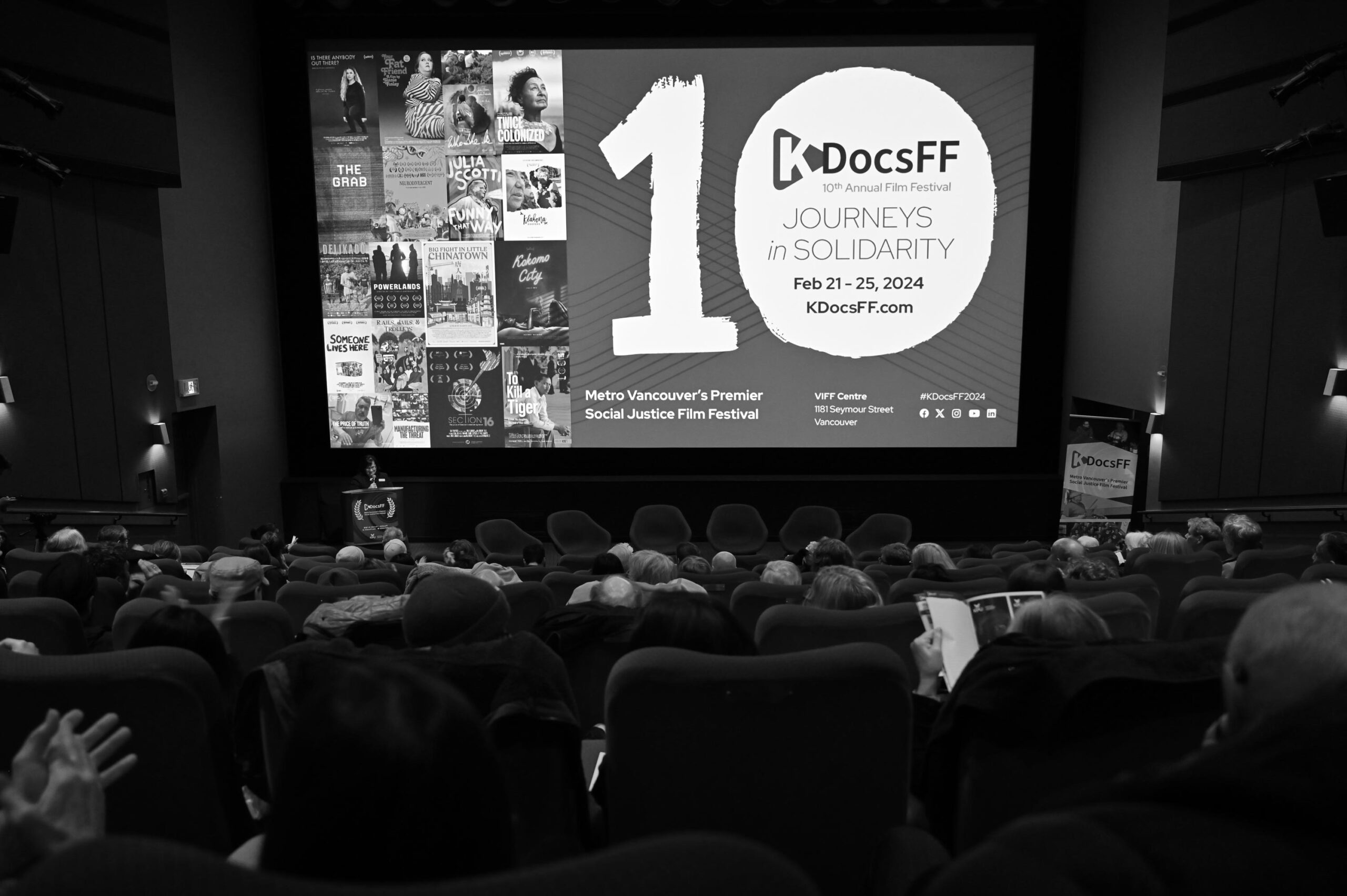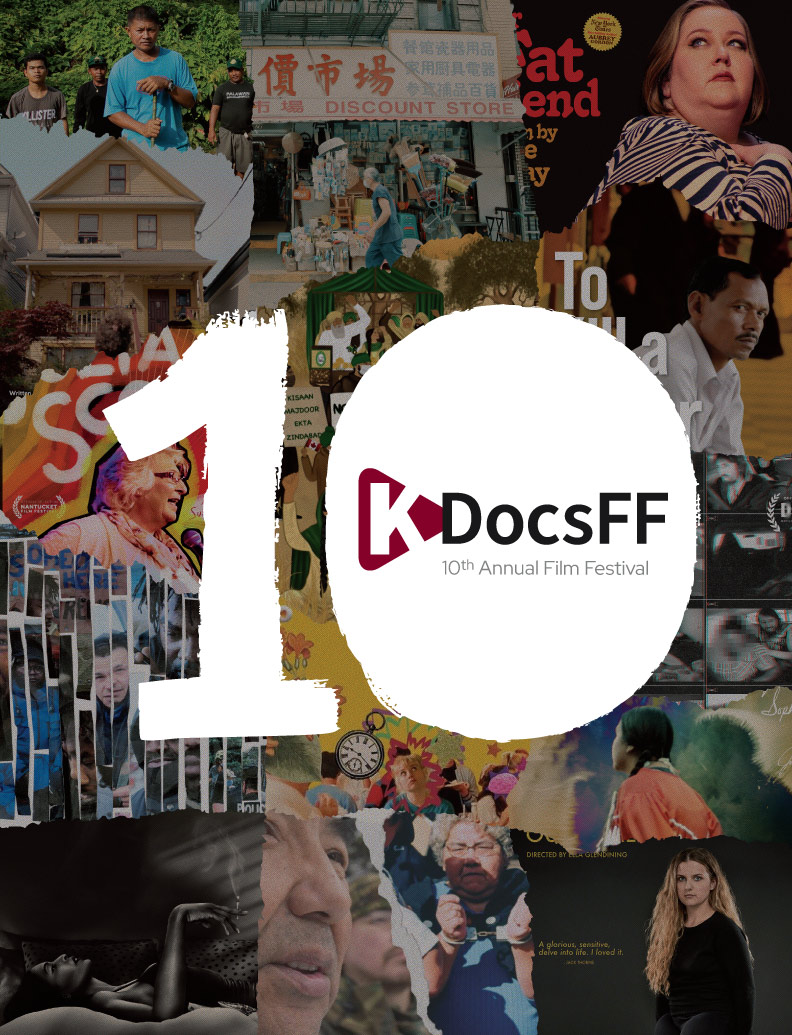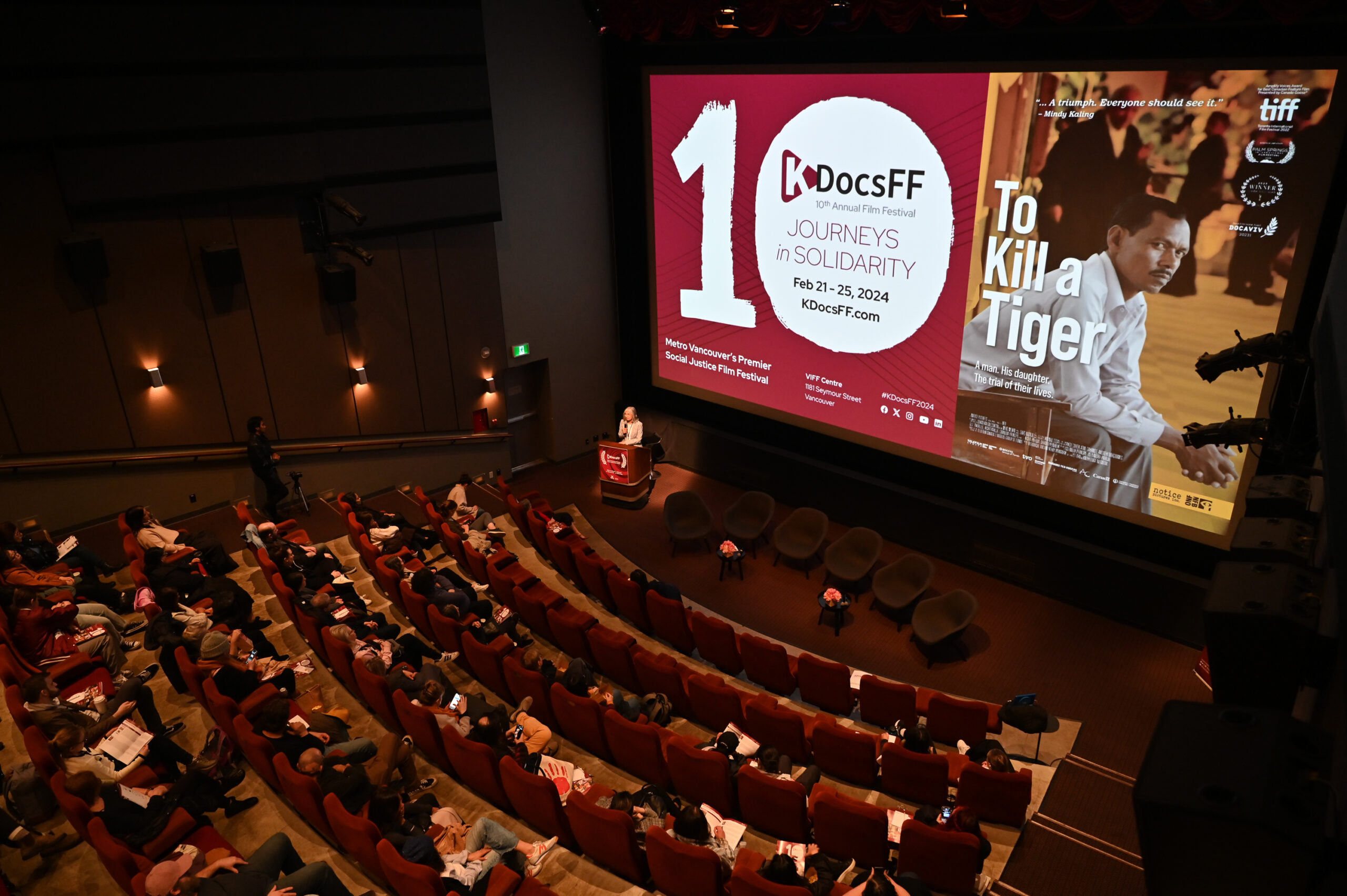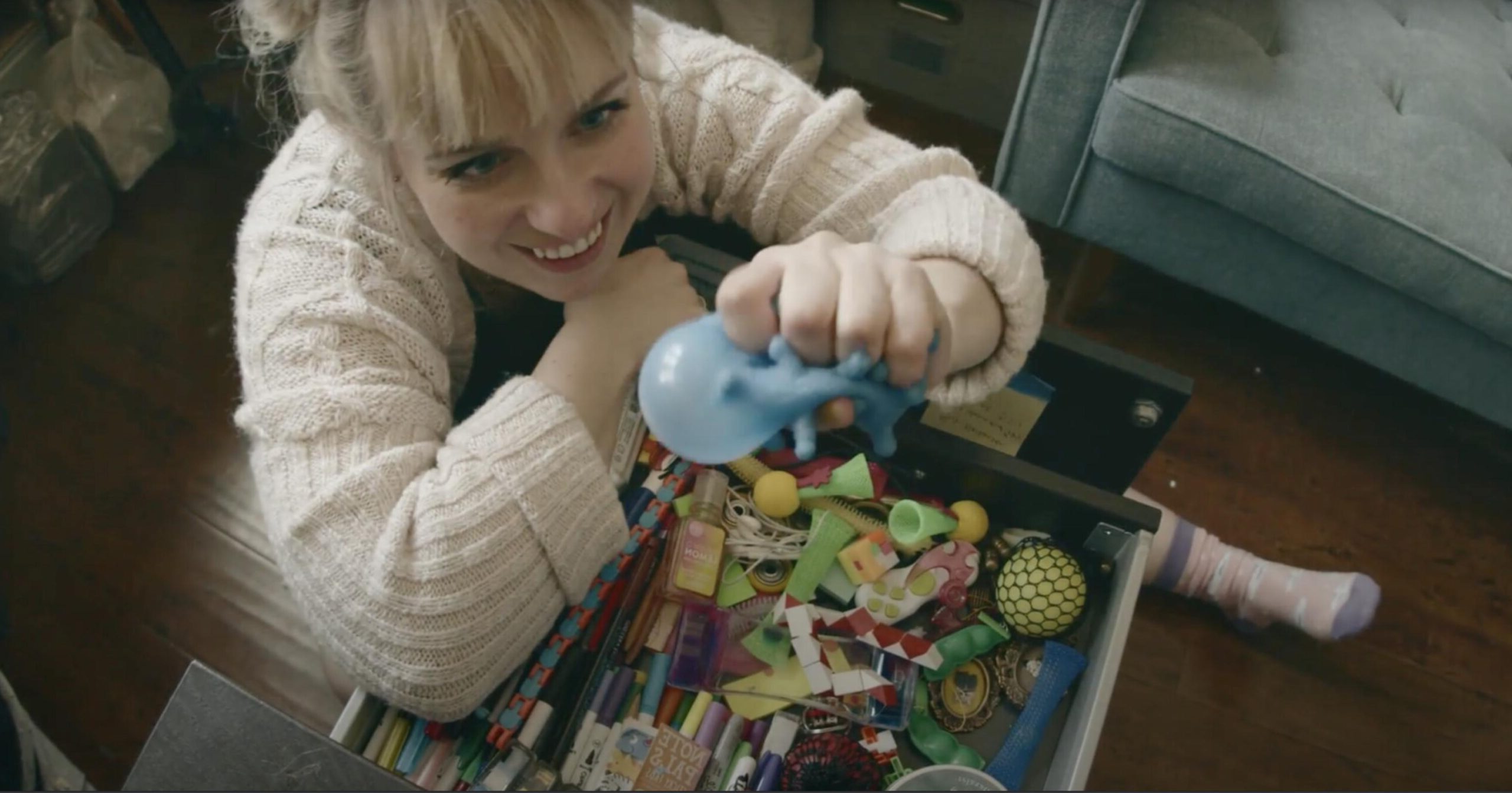
2024 FestivalJOURNEYS in SOLIDARITY.
POSTER

KDocsFF’s 10th Anniversary Film Festival.
Our 10th Annual Film Festival was a testament to the powerful stories that inspire, inform, and challenge our perspectives. Our diverse selection of films commemorated over a decade of celebrating the art of storytelling through the lenses of documentary film and documentary activism.
Courtesy of Kwantlen’s Library, you can read a bibliographic listing of additional resources for the KDocsFF 2024 films.
OUR FILMS 2024 Films
Big Fight in Little Chinatown is a story of community resistance and resilience. Set against the backdrop of the COVID pandemic and an unprecedented rise in anti-Asian racism, the documentary takes us into the lives of residents, businesses, and community organizers whose neighborhoods are facing active erasure. Coast to coast, the film follows Chinatown communities resisting the pressures around them. From the construction of the world’s largest vertical jail in New York, Montreal’s fight against developers swallowing up the most historic block of their Chinatown, big box chains and gentrification forces displacing Toronto’s community, to a Vancouver Chinatown business holding steadfast, the film reveals how Chinatown is both a stand-in for other communities who’ve been wiped off the city map, and the blueprint for inclusive and resilient neighbourhoods of the future.
Palawan appears to be an idyllic tropical island. Its powder-white beaches and lush forests have made it one of Asia’s hottest new tourist destinations. But for a tiny network of environmental crusaders and vigilantes trying to protect its spectacular natural resources, it is more akin to a battlefield. Delikado follows Bobby, Tata, and Nieves, three magnetic leaders of this network, as they risk their lives in David versus Goliath-style struggles trying to stop politicians and businessmen from destroying the Philippines’ ‘last ecological frontier.’ It is a timely film emblematic of the struggles globally for land defenders as they are being killed in record numbers trying to save natural resources from being plundered by corporations and governments. As the world faces its sixth-mass extinction and the climate emergency worsens, Delikado offers a story of courage and resilience to inspire others into action. It is also a unique expose of former president Rodrigo Duterte’s ‘war on drugs’ in the Philippines, which claimed thousands of lives and the International Criminal Court of Justice has said may amount to a crime against humanity. Delikado shows the drug war was used as a tool for politicians to control the levers of economic and political power. Delikado offers a story of courage and resilience to inspire others into action.
Born with a disability so rare that no reliable statistics for it exist, filmmaker Ella Glendining wonders if there is anyone who can share the experience of living in a body like hers. This simple question, one which nondisabled people so often take for granted, leads to a journey to not only others who live like her, but also to the realization that meeting them changes how she sees herself in the world, as well as many surprises on this journey. With intimate personal diaries, conversations with similarly bodied people and doctors treating her condition, and a searching and unique perspective, Is There Anybody Out There? invites the viewer to consider questions and assumptions they may have never encountered before. Are people born this way to be ‘fixed’ by medicine? Is it ableist to see disabled people as living an undesired existence? With warmth and an infectious joy for her body and life as it is, Glendining takes you on an unforgettable experience that will change how you see others, like and unlike you.
With breathtaking emotional honesty, this tender, funny, and powerful portrait of transgender comedian Julia Scotti explores the unrelenting courage and humor it takes to be Julia. In the comedy boom of the 1980s, Rick Scotti was a busy guy— appearing in clubs across the country, on bills with Chris Rock and Jerry Seinfeld, when he came to the dawning realization that nothing felt right. At a time when the words gender dysphoria and gender reassignment surgery were rarely heard, Rick’s true awakening at age 47 led to a new identity as Julia Scotti. And then everyone turned away—former wives, friends, family, comedy world buddies, and most painfully, Julia was shut out from any contact with her children. Julia reinvented herself, spent a decade teaching, and then several years ago, stepped back on stage and began her journey back to the world she loves, and her children reached out to her after 15 years of silence. Shot over a period of five years, Julia Scotti: Funny That Way tracks Julia’s triumphant comeback and the complex process of reuniting with her children, as comedy becomes the shared language of identity, healing, and joy.
In the wildly entertaining and refreshingly unfiltered documentary Kokomo City, filmmaker D. Smith passes the mic to four Black transgender sex workers in Atlanta and New York City—Daniella Carter, Koko Da Doll, Liyah Mitchell, and Dominique Silver—who unapologetically break down the walls of their profession. Holding nothing back, the film vibrates with energy, sex, challenge, and hardearned wisdom. This vital portrait, edited and shot by Smith in bold black and white, is her feature directorial debut. A two-time Grammy-nominated producer, singer, and songwriter, Smith made history as the first trans woman cast on a primetime unscripted TV show. Executive produced by Lena Waithe, Kokomo City won the Sundance Film Festival’s NEXT Innovator Award and NEXT Audience Award, as well as the Berlinale’s Audience Award in the Panorama Documentary section.
Manufacturing the Threat is a feature-length documentary which examines a deeply disturbing episode in Canadian history, when an impoverished couple was coerced by undercover law enforcement agents into carrying out a terrorist bombing. Further, viewers learn that this case is far from unique in the context of Canadian intelligence. Shining a light into the murky world of police infiltration, incitement, and agent provocateurs, Manufacturing the Threat shows how Canada’s policing and national security agencies, granted additional powers after 9/11, routinely break laws with little to no accountability or oversight.
In this profoundly personal mixed media experience inside the ADHD mind, Neurodivergent follows the filmmaker’s journey as she discovers her ADHD diagnosis during the height of the Covid-19 pandemic. From Post-it notes to magnets, keys, pens, rubber bands, and receipts, the unorganized chaos of a junk drawer is the perfect representation of what Afton Quast Saler’s brain feels like every day. Growing up, she knew she wasn’t like the other kids but never really understood why, and doctors didn’t seem to be much help. She was diagnosed with depression, anxiety, rapid cycle bipolar, fibromyalgia, addiction disorders, premenstrual dysphoric disorder, insomnia, and dyslexia–but none of those diagnoses felt right. In a unique way of coping with this new information, she courageously decides to put herself in front of the camera and, with the help of her husband, Jesse, documents this very personal journey.
In Powerlands, Ivey Camille Manybeads Tso, a young Navajo filmmaker, investigates the displacement of Indigenous people and the devastation of the environment caused by the same chemical companies that have exploited the land where she was born. She travels to the La Guajira region in rural Colombia, the Tampakan region of the Philippines, the Tehuantepec Isthmus of Mexico, and the protests at Standing Rock. In each case, she meets Indigenous women leading the struggle against the same corporations that are causing displacement and environmental catastrophe in her own home. Inspired by these women, Ivey Camille brings home the lessons from these struggles to the Navajo Nation.
Rails, Jails and Trolleys documents history’s largest farmers’ protest and the Canadian diaspora’s response to it. This groundbreaking documentary captures the electric ethos of a protest that received international attention and the resounding response by Canadians to the movement. A full year in the making the documentary tells the story of why and how the farmers’ movement ignited a nation and youth, women and men from all over the world.
ReWilding the Classroom educates viewers about the Youth Leadership in Sustainability initiative (YLS), a onesemester program that integrates curricular activities with the environment. Youth featured in Rewilding took part in Kawartha Pine Ridge District School Board’s integrated curriculum four-credit program based out of Trent University. This semester-long fall opportunity involves unique environmental education opportunities for young people.
Women journalists in South Africa who expose wrongdoing by those in power are often forced to endure deeply personal, frightening attacks on social media, as the four leading reporters interviewed for Section 16 disclose. Investigative reporters for publications that include The Daily Maverick and Die Beeld discuss the impact on them of targeted social media negativity, including direct threats to their safety. As one explains, when influential politicians with millions of followers, such as Julius Malema, malign them on social media and call for action, the danger they face is very real. But Ferial Haffajee, Marianne Thamm, Pauli van Wyk, Caryn Dolley, and others like them continue to write about corruption, crime in high places, and state collusion. What motivates them to keep going is relevant to us all.
Throughout the COVID pandemic, Toronto has seen a catastrophic increase in homelessness. Sick of seeing his city unable to care for its unhoused people, Khaleel Seivwright quit his job as a full-time carpenter and dedicated himself to building insulated shelters–called ‘tiny shelters.’ Innovatively using body temperature for heating, Khaleel’s efforts garnered international media attention, leading Toronto to propose a possible partnership–only to reverse its decision a week later. Capturing the ups and downs of Khaleel’s brilliant intervention, Someone Lives Here also features the voices of those experiencing homelessness, including the articulate and philosophical Taka. The film poignantly captures the City of Toronto’s costly $1.9 million clearance of Toronto’s park encampments, asking all the right questions: what makes Toronto unable and unwilling to address this humanitarian crisis? Why are people like Khaleel being prevented from trying to find solutions? Who do we prioritize in this city? A sobering and maddening watch.
The Klabona Keepers is a fierce account of the Tahltan Nation’s struggle to protect the Klabona Sacred Headwaters, an important natural habitat in northwest British Columbia, from commercial mining. The documentary intersperses verit. cinematography with intimate interviews. It is an in-depth account of the different methods of resistance used by Indigenous elders, which include blockades and tense stand-offs with police and mining industry workers. Powerful moments of reflection are felt throughout the film as the trauma of residential schools and forced relocations are brought to light. The project is a collaboration between non-Indigenous filmmakers and Indigenous elders, who were given ownership of the intellectual property, with all proceeds from the film going towards youth programming at the Klabona Sacred Headwaters.
How far would you go to defend the idea of an open press? The Price of Truth is the extraordinary story of a man who risks everything, to preserve freedom of speech in Russia. It is a tale of bravery, defiance, and a simple refusal to give in to Vladimir Putin—whatever the cost. In December 2021, Dmitry Muratov is awarded the Nobel Peace Prize. He is the editor-in-chief of Russia’s only independent newspaper, Novaya Gazeta. Since he founded Novaya, six of his journalists have been murdered after their reports displeased the state, most famously, reporter Anna Politkovskaya, gunned down in the lift of her Moscow apartment. Another war dominates this film. In February 2022, Russia invades Ukraine. In early March, using the cover of a documentary film festival, Muratov secretly negotiates free passage for 40 journalists with the Latvian government. Then, all too aware of the risk he is running, he returns to Moscow to look after his paper and its remaining staff. In May, he announces that he is going to auction his Nobel medal and give the money to Ukrainian refugees. Days later, he is on a train home to see his mother. Suddenly, a masked attacker bursts into his compartment and pours red paint all over him. The paint is laced with acetone. Dima’s eyesight is permanently damaged. Undaunted, he goes ahead with the auction. And on June 21, Muratov’s medal sells for a record $103 million. To this day, he refuses to leave Moscow, whatever the pressure on him and his team. ‘Putin stands for death. I stand for life.’
A poor farmer in rural India defies tradition and community seeking justice for his 13-year-old daughter. Ranjit’s oldest child is brutally raped by three men while attending a relative’s wedding. The family immediately files a police report, learning ostracism from their town, who see marrying the girl off to one of the rapists as the solution. When it becomes clear the family won’t back down from pursuing the perpetrators in court, that exclusion turns to threats of violence. In equal turns agonizing and uplifting, To Kill a Tiger follows Ranjit as he battles guilt, community intimidation, a mounting financial burden, and an uninterested police force, all while attempting to support his daughter through the trauma of her attack and its aftermath. Fear and fatigue creep in as the judicial process drags on. Doubt arises as to whether a guilty verdict will heal the rift in the communit or only serve to widen it. Yet through it all, Ranjit never wavers from the radical act that seems so simple to him: fully recognizing his daughter’s humanity.
Aaju Peter is a force of nature. She is a renowned Greenlandic Inuit lawyer and activist who defends the human rights of Indigenous peoples of the Arctic and a fierce protector of her ancestral lands. She works to bring her colonizers in both Canada and Denmark to justice and deploys her effusive spirit and illuminating wit to provoke self-examination and personal responsibility among Westerners for imposing their colonial ways. As Aaju launches an effort to establish an Indigenous forum at the European Union, she also embarks upon a complex and deeply personal journey to mend her own wounds, including the unexpected passing of her youngest son. In the inspiring, emotionally powerful Twice Colonized, the beautiful lens of director Lin Alluna journeys alongside an extraordinary human being as she plumbs through the social and personal wreckage of sanctioned white dominance to find the strength—within her abilities, her community, and her own vulnerabilities—to transform her hardships and painful experiences into something amazing that can inspire others who also struggle with the poisonous effects of colonialism.
Who She Is tells the story of four individual women caught in the Missing and Murdered Indigenous Women (MMIW) epidemic. By bringing these missing women to life on screen, through animation and first-person storytelling, the documentary aims to humanize the people behind the statistics. Audiences will learn each woman’s loves and losses and will come to know their story. Through these women, the documentary hopes to shine a light on the wider MMIW epidemic and gendered violence.
Aubrey Gordon began her career writing with candor and humor as the anonymous blogger ‘Your Fat Friend.’ Her searingly honest writing describes what it’s like to be a fat woman in the world, how the fantasies peddled by the diet and wellness industry are worth $26 billion a year, and how the biggest threat to fat people’s health might just be the bias that some many health care providers hold for fat people. Aubrey spent a decade campaigning for LGBTQIA rights, so she knows that change is possible. Now it’s time to advocate for herself. For Aubrey, this isn’t about ‘body positivity’ co-opted by brands to sell fat-kinis to size 16 women. It’s about bringing about a paradigm shift in the way that we treat fat people and the fat on our own bodies. It has brought her an insatiable worldwide audience, and threats to her life. Your Fat Friend follows Aubrey’s rise from anonymous blogger to New York Times best-selling author and co-host of the podcast Maintenance Phase and charts the complexities of finding a place in the world when you don’t quite fit in.

2024 FILMSWant to watch panel talks and more content?

WORD ON THE STREET
Have you ever dreamt of being part of a community that truly values and supports filmmakers? Look no further than KDocsFF!
As a filmmaker and keynote speaker this year, the level of care and hospitality I received was astounding. From the warm welcome by Janice and Greg to the dedicated volunteers, every interaction is meaningful and impactful. You’ll leave feeling inspired and connected to a community of like-minded individuals. And let’s not forget about the films! The lineup of films at KDocsFF is nothing short of powerful and thought-provoking. Each film leaves a lasting impact, sparking important conversations and opening minds to new perspectives. If you’re looking for a space to showcase your work and connect with a community of passionate filmmakers and social justice leaders, look no further than KDocsFF. The support and hospitality here are second to none, making it an experience you’ll never forget.”
Afton Quast SalerDirector, Neurodivergent, and Keynote Speaker and Panelist, KDocsFF 2024
Shape Change with Us
How Can You Contribute?
Your involvement as a partner goes beyond mere support — it’s an opportunity to be at the forefront of driving social change through film. Join us in this transformative journey.
Why Partner with Us?
Your support fuels our mission, enabling us to bring you thought-provoking documentaries and engage wider communities in meaningful dialogues. Together, we can amplify the impact of social justice narratives.

